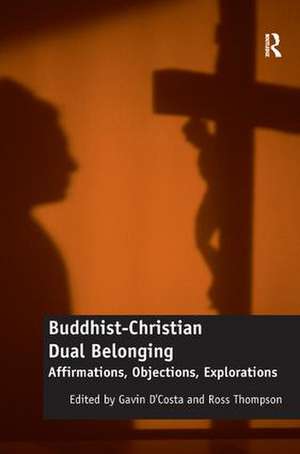Buddhist-Christian Dual Belonging: Affirmations, Objections, Explorations
Editat de Gavin D'Costa, Ross Thompsonen Limba Engleză Hardback – 11 dec 2015
| Toate formatele și edițiile | Preț | Express |
|---|---|---|
| Paperback (1) | 259.98 lei 6-8 săpt. | |
| Taylor & Francis – 30 iun 2020 | 259.98 lei 6-8 săpt. | |
| Hardback (1) | 823.17 lei 6-8 săpt. | |
| Taylor & Francis – 11 dec 2015 | 823.17 lei 6-8 săpt. |
Preț: 823.17 lei
Preț vechi: 1104.69 lei
-25% Nou
Puncte Express: 1235
Preț estimativ în valută:
157.53€ • 163.47$ • 131.67£
157.53€ • 163.47$ • 131.67£
Carte tipărită la comandă
Livrare economică 15-29 martie
Preluare comenzi: 021 569.72.76
Specificații
ISBN-13: 9781472460912
ISBN-10: 147246091X
Pagini: 240
Dimensiuni: 156 x 234 x 24 mm
Greutate: 0.64 kg
Ediția:1
Editura: Taylor & Francis
Colecția Routledge
Locul publicării:Oxford, United Kingdom
ISBN-10: 147246091X
Pagini: 240
Dimensiuni: 156 x 234 x 24 mm
Greutate: 0.64 kg
Ediția:1
Editura: Taylor & Francis
Colecția Routledge
Locul publicării:Oxford, United Kingdom
Cuprins
Introduction. Part I: Affirmations Chapter 1: Chasing Two Rabbits? Dual Belonging and the Question of Salvation/Liberation. Chapter 2: The Question of Salvation/Liberation: A Double-Belonger's Perspective. Chapter 3: Creation, Dependent Arising and Dual Belonging. Part II: Challenges Chapter 4: 'There Can Only Be One:' The Impossibility and Idolatry of 'Dual Belonging'. Chapter 5: The Ultimate Buddhist Religious Goal, Nirvana and its Implications for Buddhist-Christian Dual Belonging. Chapter 6: A Roman Catholic approach to Buddhist-Catholic 'dual-belonging'. Chapter 7: Dual Belonging, Ritual and the Spiritual Revolution. Chapter 8: Strategies of Negotiation in Buddhist-Christian Dual Belonging. Part III: Explorations Chapter 9: An alternative concetion of multiple religious belonging: A Buddhist-Catholic perspective. Chapter 10: The Buddhist Faith of Non-Buddhists: from dual belonging to dual attachment. Chapter 11: Dual-belonging and Pure Land Buddhism. Chapter 12: Going Beyond the Creator God: an Apophatic approach to Buddhist-Christian Dual Religious Belonging. Conclusion.
Notă biografică
Gavin D'Costa is author of seven books, most recently: Christianity and the World Religions. Disputed Questions in the Theology of Religions; and Vatican II and the World Religions. He is an advisor to the Vatican, the Roman Catholic Bishops in England and Wales, and to the Church of England, Board of Mission on matters related to other religions. His interests lie in systematic and dogmatic theology, gender and psychoanalysis, and the Christian theology of interreligious dialogue.
Ross Thompson served for 20 years as a parish priest in Bristol, and taught doctrine and ethics at St Michael's, Llandaff and Cardiff University. His recent works include Buddhist Christianity: A Passionate Openness and A Wounded Wisdom: A Buddhist and Christian Response to Evil, Hurt and Harm. His main research interests are exploration of the interface between Christianity, Buddhism and science, and the development of a spirituality drawing on all three.
Ross Thompson served for 20 years as a parish priest in Bristol, and taught doctrine and ethics at St Michael's, Llandaff and Cardiff University. His recent works include Buddhist Christianity: A Passionate Openness and A Wounded Wisdom: A Buddhist and Christian Response to Evil, Hurt and Harm. His main research interests are exploration of the interface between Christianity, Buddhism and science, and the development of a spirituality drawing on all three.
Recenzii
"Provides an excellent and truly ground-breaking resource for reflection on inter-faith relations." - Keith Ward, Heythrop College, UK
"Buddhist-Christian Dual Belonging convenes a serious conversation among experienced scholars committed to thinking through the very idea of dual belonging. Every pro and con is taken seriously, benefits and drawbacks noted, and little goes unchallenged. Important Christian voices are heard while, refreshingly, Buddhists participate fully in the debate. These illuminating essays will be a resource in the ongoing conversation among religious scholars and practitioners in every tradition." - Francis X Clooney, SJ, Harvard University, USA
"This volume brings much-needed clarity, depth, and rigor to emerging debates over dual religious belonging. Even as the essays challenge or affirm the phenomenon of dual belonging from distinct angles, they cohere as a single, densely woven conversation. As a whole, the book maps the lay of the land by marking contested sites such as the nature of religion, the nature of faith, and what it means to belong to a community." - Michelle Voss Roberts, Wake Forest University, USA
"Buddhist-Christian Dual Belonging convenes a serious conversation among experienced scholars committed to thinking through the very idea of dual belonging. Every pro and con is taken seriously, benefits and drawbacks noted, and little goes unchallenged. Important Christian voices are heard while, refreshingly, Buddhists participate fully in the debate. These illuminating essays will be a resource in the ongoing conversation among religious scholars and practitioners in every tradition." - Francis X Clooney, SJ, Harvard University, USA
"This volume brings much-needed clarity, depth, and rigor to emerging debates over dual religious belonging. Even as the essays challenge or affirm the phenomenon of dual belonging from distinct angles, they cohere as a single, densely woven conversation. As a whole, the book maps the lay of the land by marking contested sites such as the nature of religion, the nature of faith, and what it means to belong to a community." - Michelle Voss Roberts, Wake Forest University, USA
Descriere
A growing number of people describe themselves as both Buddhist and Christian; but does such a self-description really make sense? Exploring the growing phenomenon of Buddhist-Christian dual belonging, a wide variety of authors including focus on three key questions: Can Christian and Buddhist accounts and practices of salvation be reconciled? Are Christian theism and Buddhist non-theism compatible? And does dual belonging inevitably distort the essence of these faiths, or merely change its cultural expression? Clarifying different ways of justifying dual belonging, contributors offer criticisms of dual belonging from different religious perspectives and from alternative methodological approaches.
